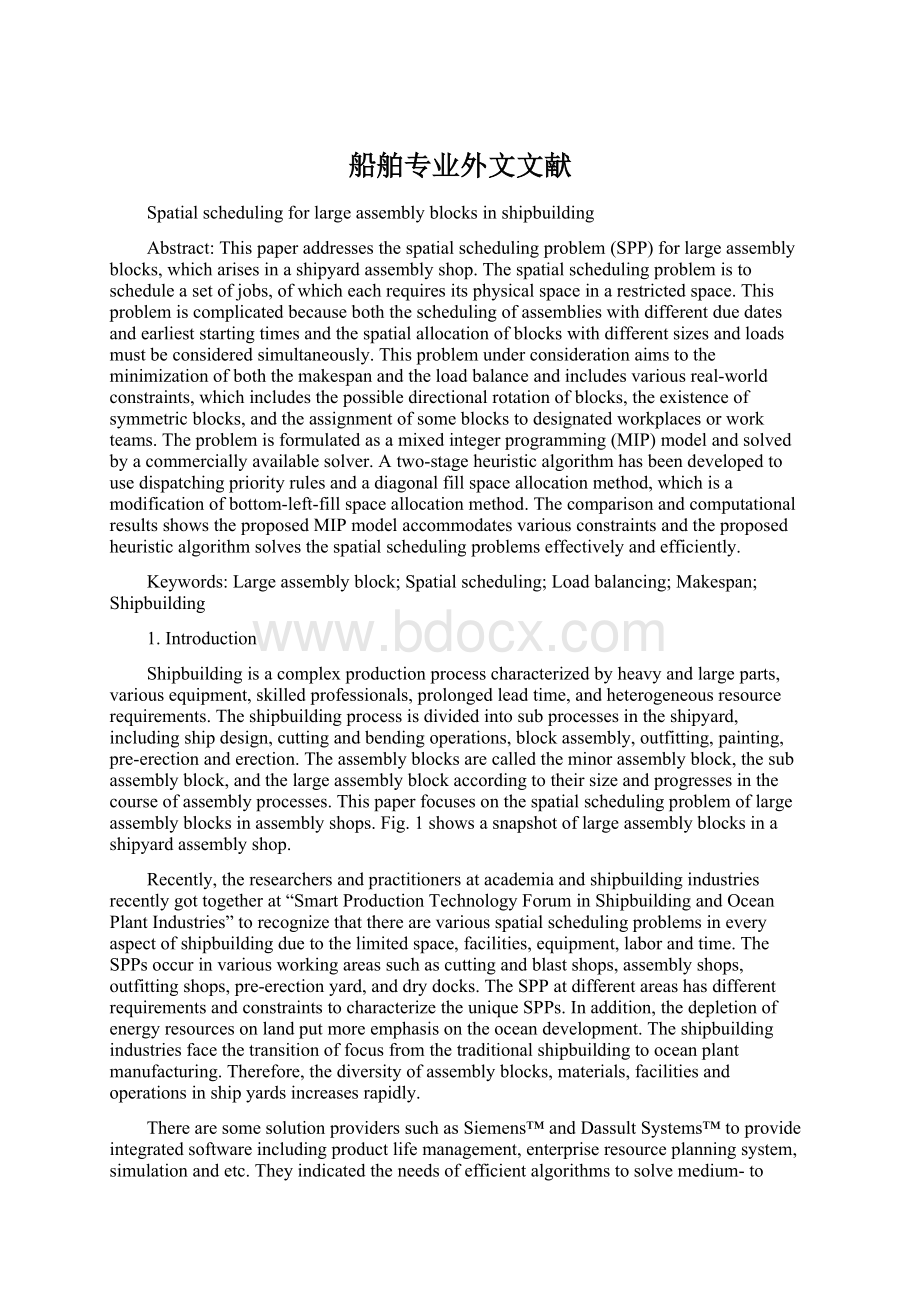船舶专业外文文献.docx
《船舶专业外文文献.docx》由会员分享,可在线阅读,更多相关《船舶专业外文文献.docx(21页珍藏版)》请在冰豆网上搜索。

船舶专业外文文献
Spatialschedulingforlargeassemblyblocksinshipbuilding
Abstract:
Thispaperaddressesthespatialschedulingproblem(SPP)forlargeassemblyblocks,whicharisesinashipyardassemblyshop.Thespatialschedulingproblemistoscheduleasetofjobs,ofwhicheachrequiresitsphysicalspaceinarestrictedspace.Thisproblemiscomplicatedbecauseboththeschedulingofassemblieswithdifferentduedatesandearlieststartingtimesandthespatialallocationofblockswithdifferentsizesandloadsmustbeconsideredsimultaneously.Thisproblemunderconsiderationaimstotheminimizationofboththemakespanandtheloadbalanceandincludesvariousreal-worldconstraints,whichincludesthepossibledirectionalrotationofblocks,theexistenceofsymmetricblocks,andtheassignmentofsomeblockstodesignatedworkplacesorworkteams.Theproblemisformulatedasamixedintegerprogramming(MIP)modelandsolvedbyacommerciallyavailablesolver.Atwo-stageheuristicalgorithmhasbeendevelopedtousedispatchingpriorityrulesandadiagonalfillspaceallocationmethod,whichisamodificationofbottom-left-fillspaceallocationmethod.ThecomparisonandcomputationalresultsshowstheproposedMIPmodelaccommodatesvariousconstraintsandtheproposedheuristicalgorithmsolvesthespatialschedulingproblemseffectivelyandefficiently.
Keywords:
Largeassemblyblock;Spatialscheduling;Loadbalancing;Makespan;Shipbuilding
1.Introduction
Shipbuildingisacomplexproductionprocesscharacterizedbyheavyandlargeparts,variousequipment,skilledprofessionals,prolongedleadtime,andheterogeneousresourcerequirements.Theshipbuildingprocessisdividedintosubprocessesintheshipyard,includingshipdesign,cuttingandbendingoperations,blockassembly,outfitting,painting,pre-erectionanderection.Theassemblyblocksarecalledtheminorassemblyblock,thesubassemblyblock,andthelargeassemblyblockaccordingtotheirsizeandprogressesinthecourseofassemblyprocesses.Thispaperfocusesonthespatialschedulingproblemoflargeassemblyblocksinassemblyshops.Fig.1showsasnapshotoflargeassemblyblocksinashipyardassemblyshop.
Recently,theresearchersandpractitionersatacademiaandshipbuildingindustriesrecentlygottogetherat“SmartProductionTechnologyForuminShipbuildingandOceanPlantIndustries”torecognizethattherearevariousspatialschedulingproblemsineveryaspectofshipbuildingduetothelimitedspace,facilities,equipment,laborandtime.TheSPPsoccurinvariousworkingareassuchascuttingandblastshops,assemblyshops,outfittingshops,pre-erectionyard,anddrydocks.TheSPPatdifferentareashasdifferentrequirementsandconstraintstocharacterizetheuniqueSPPs.Inaddition,thedepletionofenergyresourcesonlandputmoreemphasisontheoceandevelopment.Theshipbuildingindustriesfacethetransitionoffocusfromthetraditionalshipbuildingtooceanplantmanufacturing.Therefore,thediversityofassemblyblocks,materials,facilitiesandoperationsinshipyardsincreasesrapidly.
TherearesomesolutionproviderssuchasSiemens™andDassultSystems™toprovideintegratedsoftwareincludingproductlifemanagement,enterpriseresourceplanningsystem,simulationandetc.Theyindicatedtheneedsofefficientalgorithmstosolvemedium-tolarge-sizedSPPproblemsin20 min,sothattheshopcanquicklyre-optimizetheproductionplanuponthefrequentandunexpectedchangesinshopfloorswiththeongoingoperationsonexitingblocksintact.
Therearemanydifferentapplicationswhichrequireefficientschedulingalgorithmswithvariousconstraintsandcharacteristics(KimandMoon,2003,Kimetal.,2013,NguyenandYun,2014 and Yanetal.,2014).However,thespatialschedulingproblemwhichconsidersspatiallayoutanddynamicjobschedulinghasnotbeenstudiedextensively.Untilnow,spatialschedulinghastobecarriedoutbyhumanschedulersonlywiththeirexperiencesandhistoricaldata.Evenwhenhumanexpertshavemuchexperienceinspatialscheduling,ittakesalongtimeandintensiveefforttoproduceasatisfactoryschedule,duetothecomplexityofconsideringblocks’geometricshapes,loads,requiredfacilities,etc.Inpractice,spatialschedulingformorethanasix-monthperiodisbeyondthehumanschedulers’capacity.Moreover,thespaceintheworkingareastendstobethemostcriticalresourceinshipbuilding.Therefore,theeffectivemanagementofspatialresourcesthroughautomationofthespatialschedulingprocessisacriticalissueintheimprovementofproductivityinshipbuildingplants.
Ashipyardassemblyshopisconsistedofpinnedworkplaces,equipment,andoverhangcranes.Duetotheheavyweightoflargeassemblyblock,overhangcranesareusedtoaccessanyareasoverotherobjectswithoutanyhindranceintheassemblyshop.Theheightofcranescanlimittheheightofblocksthatcanbeassembledintheshop.Theshopcanbeconsideredasatwo-dimensionalspace.Theblocksareplacedonpreciselypinnedworkplaces.
Oncetheblockisallocatedtoacertainareainaworkplace,itisdesirablenottomovetheblockagaintodifferentlocationsduetothesizeandweightofthelargeassemblyblocks.Therefore,itisimportanttoallocatetheworkspacetoeachblockcarefully,sothattheworkspaceinanassemblyshopcanbeutilizedinamostefficientway.Inaddition,sinceeachblockhasitsduedatewhichispre-determinedatthestageofshipdesign,thetardinessofablockassemblycanleadtoseveredelayinthefollowingoperations.Therefore,inthespatialschedulingproblemforlargeassemblyblocks,theschedulingofassemblyprocessesforblocksandtheallocationofblockstospecificlocationsinworkplacesmustbeconsideredatthesametime.Astheterminologysuggests,spatialschedulingpursuestheoptimalspatiallayoutandthedynamicschedulewhichcanalsosatisfytraditionalschedulingconstraintssimultaneously.Inaddition,therearemanyconstraintsorrequirementswhichareseriousconcernsonshopfloorsandthesecomplicatetheSPP.Theconstraintsorrequirementsthisstudyconsideredareexplainedhere:
(1)Blockscanbeputineitherdirections,horizontalorvertical.
(2)Sincetheshipissymmetricaroundthecenterline,thereexistsymmetricblocks.Thesesymmetricblocksarerequiredtobeputnexttoeachotheronthesameworkplace.(3)Someblocksarerequiredtobeputonacertainspecialareaoftheworkplace,becausetheworkteamsonthatareahasspecialequipmentorskillstoachieveacertainlevelofqualityorcompletethenecessarytasks.(4)Frequently,theproductionplanmaynotbeimplementedasplanned,sothatfrequentmodificationsinproductionplansarerequiredtocopewiththechangesintheshop.Atthesemodifications,itisrequiredtoproduceanewmodifiedproductionplanwhichdoesnotremoveormovethepre-existingblocksintheworkplacetocompletetheongoingoperations.(5)Ifpossibleatanytime,theloadbalancingovertheworkteams,i.e.,workplacesaredesirableinordertokeepalltaskassignmentstoworkteamsfairanduniform.
Lee,Lee,andChoi(1996)studiedaspatialschedulingthatconsidersnotonlytraditionalschedulingconstraintslikeresourcecapacityandduedates,butalsodynamicspatiallayoutoftheobjects.Theyusedtwo-dimensionalarrangementalgorithmdevelopedbyLozano-Perez(1983)todeterminethespatiallayoutofblocksinshipbuilding.Koh,Park,Choi,andJoo(1999)developedablockassemblyschedulingsystemforashipbuildingcompany.Theyproposedatwo-phaseapproachthatincludesaschedulingphaseandaspatiallayoutphase.Koh,Eom,andJang(2008)extendedtheirpreciousworks(Kohetal.,1999)byproposingthelargestcontactareapolicytoselectabetterallocationofblocks.Cho,Chung,Park,Park,andKim(2001)proposedaspatialschedulingsystemforblockpaintingprocessinshipbuilding,includingblockscheduling,fourarrangementalgorithmsandblockassignmentalgorithm.Parketal.(2002)extendedChoetal.(2001)utilizingstrategysimulationintwoconsecutiveoperationsofblastingandpainting.Shin,Kwon,andRyu(2008)proposedabottom-left-fillheuristicmethodforspatialplanningofblockassembliesandsuggestedaplacementalgorithmforblocksbydifferentialevolutionarrangementalgorithm.Liu,Chua,andWee(2011)proposedasimulationmodelwhichenabledmultiplepriorityrulestobecompared.Zheng,Jiang,andChen(2012)proposedamathematicalprogrammingmodelforspatialschedulingandusedseveralheuristicspatialschedulingstrategies(gridsearchingandgeneticalgorithm).ZhangandChen(2012)proposedanothermathematicalprogrammingmodelandproposedtheagglomerationalgorithm.
Thisstudypresentsanovelmixedintegerprogramming(MIP)formulationtoconsiderblockrotations,symmetricalblocks,pre-existingblocks,loadbalancingandallocationofcertainblockstopre-determinedworkspace.TheproposedMIPmodelswereimplementedbycommerciallyavailablesoftware,LINGO®andproblemsofvarioussizesaretested.ThecomputationalresultsshowthattheMIPmodelisextremelydifficulttosolveasthesizeofproblemsgrows.Toefficientlysolvetheproblem,atwo-stageheuristicalgorithmhasbeenproposed.
Section2describesspatialschedulingproblemsandassumptionswhichareusedinthisstudy.Section3presentsamixedintegerprogrammingformulation.InSection4,atwo-stageheuristicalgorithmhasbeenproposed,includingblockdispatchingpriorityrulesandadiagonalfillspaceallocationheuristicmethod,whichismodifiedfromthebottom-left-fillspaceallocationmethod.ComputationalresultsareprovidedinSection5.Theconclusionsaregi